#EDIT: Added a paragraph and a couple small sentences and changed some wording/grammar just to clean it up a bit!
Explore tagged Tumblr posts
Text
Theory - Usagi Is Meryl Mei's Son
From the first or second chapter of The Jojolands, I have had a theory that Usagi will be revealed as Meryl Mei's son. For the record, some of this could be me overthinking it BUT, just for fun, I thought I should compile my 'evidence'.
I should say that I don't follow the fandom much outside of Tumblr so idk if other people have thought of this.
Spoilers for the first 7 chapters of The Jojolands under the cut. Heads up that this post got kinda long and dense.
Visual Similarities

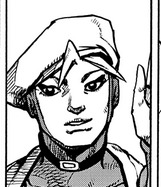

I want to start off with some visual similarities between these two. While some of this could just be stylistic trends in Araki's art, I want to point out the general shape of their jawlines and their eyes. I think Usagi is meant to have a fuller face then the other teens but this is shaky. It does look similar to Meryl Mei's face shape though. I also see similarities in their noses and eyebrows BUT I do attribute that mostly to Araki's style given how similar a lot of his noses and eyebrows are. While Usagi is sometimes drawn with wider and rounder eyes, generally they seem to be more pointed/angular and (with the 'winged eyeliner' thing he has) they resemble Meryl Mei's eyes more than the other protagonists. Below I've put a photo of his eyes alongside Dragona's and Rohan's just to help illustrate this as best as I can.
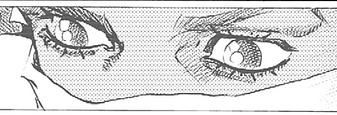
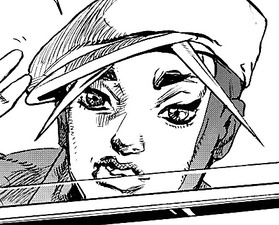

(This is a dumb point but while collecting photos I noticed Usagi and Meryl Mei both had ponytails which.... is probably nothing but I thought it was so cute.)
She Has A Mysterious Family
When we first meet Meryl Mei in Chapter 1, we get a description of her from Jodio. While Jodio does emphasise how mysterious and weird she is, one thing he mentions hearing a rumour about is her having a husband and child (as far as I can tell the sex of the child isn't specified). While this is just a rumour, I guarantee there will be some sort of follow-up to this. Early on, it introduces the idea that Meryl Mei has family that even her employees don't know about - I don't think it's too crazy to say she could have them in her business. Again, it could point to something else but it feels very early to be dropping info like that.
Introductory Scenes
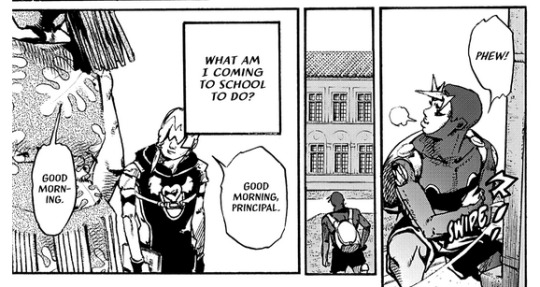
A very small thing but right after Usagi's introduction, like the very next panel, is when we first see Meryl Mei at the school. This would be a classic way of hinting at some connection between these two, but I actually want to go into the previous scene on the bus.
So the first scene we see of Usagi is him asking Jodio on the bus for drugs. Jodio is alarmed by this since they are surrounded by other students and responds by bashing Usagi. When they get off the bus though, Jodio and Paco do their routine to exchange Usagi's money for some drugs. While it's suggested Usagi is an addict, I think in hindsight it's clear that he isn't. Usagi is set up to be a fool but is then shown to be intelligent. He 'betrays' the gang but then comes back and proves his loyalty and 5000 IQ. I don't think it's crazy to say that the gang's assessment of him as an addict is inaccurate too, there's more to this but I'll get into it later.
My theory is that this scene isn't an addict asking for drugs on the bus randomly, I think this is some sort of test. Jodio is the youngest of the gang and, as shown in Chapter 2, his naivety and inexperience could cause problems for Meryl Mei. With the diamond heist coming up, as well as us hearing that Meryl Mei wants to expand her business, I think it's possible she got Usagi to ask him for drugs in a public space to see if Jodio would slip up. Just to make sure he has enough common sense and discretion to not reveal any info BUT that he still manages to make the transaction afterwards. Otherwise, it's just weird in hindsight that Usagi would do this.
EDIT: Didn't think of this until a few days after initially making this post, but if the bus scene was a test, it could be a parallel to the undercover cop scene in Chapter 2. He's being tested and lied to by both sides of the crime struggle and maybe his initial failure with the female cop is what prompted Meryl Mei's test (I think the undercover cop scene is a flashback but correct me if I'm wrong). Jodio's ego and self-worth seem like they'll be explored this part so maybe this reveal would be a bit of a blow to his confidence?
Usagi Joining The Mission

So.... there obviously has to be something going on here right? Meryl Mei somehow knows about Usagi and trusts him! (Also I completely missed that she says here he isn't an addict!!! Paco still thinks he is one in Chapter 2 but come on now). She wants him to specifically go on this extremely important heist even though the others barely know him. There has to be something going on here, and I think that him being her son would be a good explanation! She would obviously know him, his abilities, and would trust him. It would almost be like having her own set of eyes on the group to make sure the mission goes well. I don't know if any relationship between the two could garner more trust than a parent and child. And given that Meryl Mei literally sells drugs to children, I don't think she'd hesitate to involve her child in the business and send him into danger tbh.
Before I move on, I quickly wanna mention 2 small things that I noticed but seriously doubt are intentional. First is that there is a rabbit-inspired outfit design behind Meryl Mei in one panel and Usagi means 'rabbit' in Japanese. (Remember how The Jojolands was first teased with the rabbit image?) It also happens to be right beside the panel mentioning her child BUT I'LL STOP.

The second dumb thing in this scene I noticed is how Usagi suddenly shows up at the very end of the rundown of the mission. We get a panel specifically showing Dragona locking the front door after the customers leave, but then Usagi gets in somehow? Was he hiding inside already for the reveal? Also, he would've missed the briefing but doesn't seem confused and instead already seems to know what's going on? Possibly just Jojo logic though but I wanted to mention it.
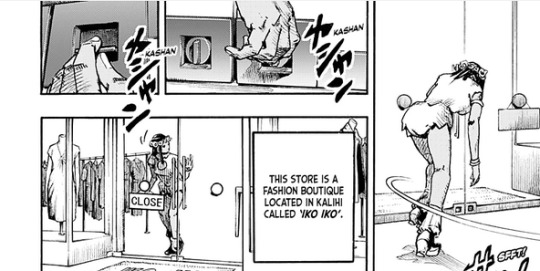
Weird Texting And Delay
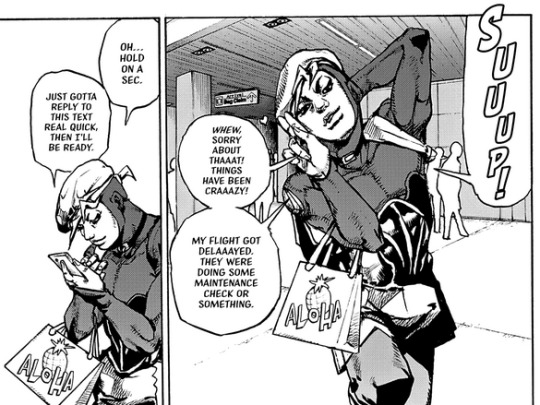
Not much to this, could just be a funny gag about Usagi being sillycore but I wonder if he could've been texting Meryl Mei here? Maybe with an update on the mission? I have no idea what the delay could've been about, we do find out later he got hamburgers at the airport (hence the bag) so maybe it's hinting at that instead? Idk to be honest, just think it's noteworthy.
The Car Place

I forgot about this, but Usagi must be experienced at this sort of thing. How does he know about this criminal-safe car rental place? Was the texting maybe him getting this info from someone? It's also strange to me HE was in charge of getting the car - I doubt the other teens would've given him that responsibility so was that an order from Meryl Mei? That's super speculative though.
(Tiny thing since you can see it clearly in the panel above - is the weird logo on his shoulder meant to be model legs??? Like women's legs in underwear and high heels???? I have no idea if that's what it is and what it could mean but Meryl Mei is in the fashion industry *shrug*. My partner thinks they could be his stands' arms instead but we're not sure. I kinda doubt this point for the record, but it doesn't hurt to mention plus I'm interested in what others think the symbol is.)
Figuring Out The Cat Stand
Another thing which at least points to Usagi being more experienced than the others despite his age and demeanor - Usagi is the first to figure out that the string attack is a stand specifically. He also suspects the cats sooner than the others, Paco angrily insists the strings are some sort of security system (???????) but Usagi knows. It's not like the others don't know about stands, maybe Usagi has dealt with stand users on missions before? Also, goes without mentioning, but his 7D chess-level plan to defeat the cats later on is very impressive but maybe suspicious.
Quickly, other examples of Usagi's intelligence/possible experience are; going straight to cutting the painting in Rohan's house, scientific knowledge with the beakers and flasks, knows about birds in the local forest, also talks about the cat plan as an 'experiment' - could his scientific knowledge tie into being involved in the illegal drug business? They do compare Rohan's science set-up to drug making. Think 'Breaking Bad' essentially.
King Crimson Parallel
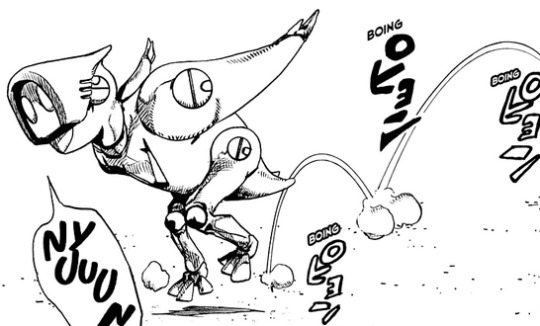
So, full credit for this final point goes to @/pandoragigi who pointed this out on a previous post I made.

They pretty much summarised it better then I ever could, this idea kinda blew my mind when they mentioned it. Sometimes it seems like Araki chooses song references randomly, but this could be a possibility. I don't have much to add besides the fact that 'Matte Kudasai' is a melancholic song which seems odd for Usagi, so maybe it has deeper meaning to his character.
To be clear, I'm not necessarily insisting with this theory that Meryl Mei or Usagi are gonna be villains. I think they could be mother and son and not be antagonists at all. I think it's unlikely Usagi is the traitor after already having a fake-out betrayal - but I do think Meryl Mei could be the traitor Rohan warned about. So if Meryl Mei is a villain then the possible parallel between Usagi and Trish could mean he remains loyal to the gang. Of course, it could also end up like Araki's initial plans for Fugo :( It's still too early to know where this story is going but I like to speculate and overthink things.
Conclusion
Ultimately, the next chapter could instantly disprove everything here. Araki has an... interesting track record with solving mysteries and reincorporating cool little details and I know theorising on this series can be pointless. I may in fact be Boo Boo the Fool for this making post :( But I'm having fun thinking about this and would personally be very excited if it came true! I have so many self-indulgent thoughts about angst possibilities and narrative parallels you could draw between Usagi+Meryl Mei and Jodio+Barbara Ann!!!! I think in a hypothetical evil!Usagi route, he could also be a great foil to Jodio. Also, what about the husband Meryl Mei is also rumoured to have? Will he appear and be relevant? But that type of speculating got things way too off-track so I cut them and might post them later. I feel like I could talk about the possible implications if this theory was true all day, but I'll cut it off here. All in all -
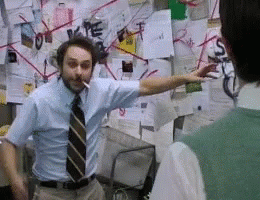
Thanks for reading :)
#the jojolands spoilers#reading the jojolands#fave#mine#stands#jjba#jojos bizarre adventure#text#gif#analysis#theory#the jojolands#usagi alohaoe#meryl mei qi#the mattekudasai#....I've never made a big public post like this before so hopefully it goes over well#god I hope this is comprehensible#I did this in one very long sitting after finishing a miserable uni essay so please pray for me lol#EDIT: Added a paragraph and a couple small sentences and changed some wording/grammar just to clean it up a bit!
24 notes
·
View notes
Text
10 Tips to Improve Your Writing Skills
1. Prepare Absorb information about writing, but don’t overwhelm yourself. I’ve been known to read a writing handbook or editing manual cover to cover, but I recommend reading one chapter or section at a time and absorbing information from online resources in similarly small doses as well. Our website is a good starting point, as it features thousands of posts about specific grammar, syntax, and style topics as well as vocabulary-building posts and more comprehensive posts about writing, editing, and language.
2. Practice Work on your writing every day. Commit to a daily writing exercise, even if you have only five minutes to spare. If you write for a living, or writing constitutes a significant proportion of your daily tasks at work, still set aside time to practice other forms of composition. Style or subject matter can vary day to day, or you can decide to, for example, respond in writing to something you experienced with any of your five senses (including anything you watched or read by way of a form of media). Alternatively, find a list of writing prompts online, and use the next one on the list each day, or choose one randomly. (Encourage family members or friends—or even coworkers—to join you in producing their own responses.)
3. Engage with Others Participating in a group learning activity is a great motivator. When you have paid for a class and/or scheduled time for attend classes or workshop sessions, you’re more likely to persevere, and completing assignments and projects will help you establish and/or maintain your writing discipline. If you’re intimidated by a group setting, consider finding a writing partner with whom you can exchange drafts and/or discuss concepts and practice skills, then graduate, on your own or with your partner, to a course or workshop. Alternatively, seek out online courses or groups.
4. Read Read for education, enjoyment, and enlightenment. For the most part, with recreational reading, just sit back and enjoy yourself. But consider devoting occasional sessions to analytical reading, in which you highlight particularly effective words, phrases, sentences, and paragraphs and think about why they stand out, and apply the techniques to your own writing.
5. Organize Use organizational techniques such as outlines and diagrams. Brainstorm keywords and essential ideas or plot points. If other forms of creative expression stimulate you, use them: Listen to (or play) music to inspire a certain mood, collect photographs or illustrations of people, places, and things that suggest elements you want to incorporate into an essay or a short story, or draw sketches of characters or settings to help you visualize them.
6. Research and Fact-Check Whether you’re writing nonfiction or fiction, take care to write authoritatively. If you’re writing a short story or a novel, read about the historical background of the setting to make sure that you are not introducing counterfactual or anachronistic elements. When crafting a newspaper, magazine, or website article, or a blog post, educate yourself on your topic, and double-check quantitative information: proper names; affiliations and relationships; and dates, distances, dollar amounts, and so on.
7. Be Flexible Write with an open mind. Be flexible about changing the focus of an article or essay or the protagonist or plot of a short story or a novel. Question your assumptions, and accept that your initial goal or message may not be the most effective or useful one, or the one that you are prepared to express just now.
8. Draft Expect to be dissatisfied by your first draft, and don’t assume that your second draft is your last. Whether you’re writing a blog post or a book manuscript, the initial iteration may only slightly resemble the final draft—which, if you also submit it for editing, will differ from the edited version. Some writers have managed to produce an admirable piece of writing on the first try, but you will very likely spend as much time revising your first draft (and subsequent efforts) as you did producing it, if not more time. Embrace the opportunity to improve your baseline output by reorganizing, inserting, and omitting text; reshaping phrases and sentences; and replacing bland verbs and tired clichés and vague descriptions.
9. Hire an Editor You’re free to post to your own blog or self-publish your novel without any further mediation, but you will be more successful as a writer if you accept that objective assistance enhances virtually everyone’s prose. Hiring an editor is a significant investment of time and money—editorial attention to a long novel, for example, can cost a couple thousand dollars and take several weeks—but if you find a good editor, the investment will be worth it. (And note that with any other service, you often get what you pay for, so when choosing an editor, focus on quality of results you will obtain rather than quantity of expense you will incur.)
If you can’t afford such an expense, at least ask a friend or acquaintance to go over your writing for you, and perhaps offer to edit something of theirs in exchange or to provide a service of similar monetary value (dog walking or pet sitting, clerical or organizational assistance, repair or construction, and so on) in return. Just understand that assistance from someone on the basis of acquaintance is less likely to be either objective or of professional caliber. Choose an editor who knows what they are doing and will not hesitate to provide revisions and critiques at the risk of damaging your ego.
10. Practice Humility Perhaps you were praised at home and/or at school for your writing, or you have won one or more writing awards, or you have had articles or stories (or even books) published. Any or all of those achievements constitute a good start. But you are still developing as a writer, and you always will be. Continue to practice these habits and welcome other opportunities to grow functionally and creatively as a writer.
You are subscribed to the free version, which is delivered once per week, contains ads and doesn't include exercises. Pro subscribers receive our tips daily, with no ads and with interactive exercises. Click here to activate your Pro subscription today!
Publish your book with our partner InstantPublisher.com! Professionally printed in as few as 7 days.
Original post: 10 Tips to Improve Your Writing Skills from Daily Writing Tips https://www.dailywritingtips.com/tips-improve-writing-skills/
0 notes
Photo
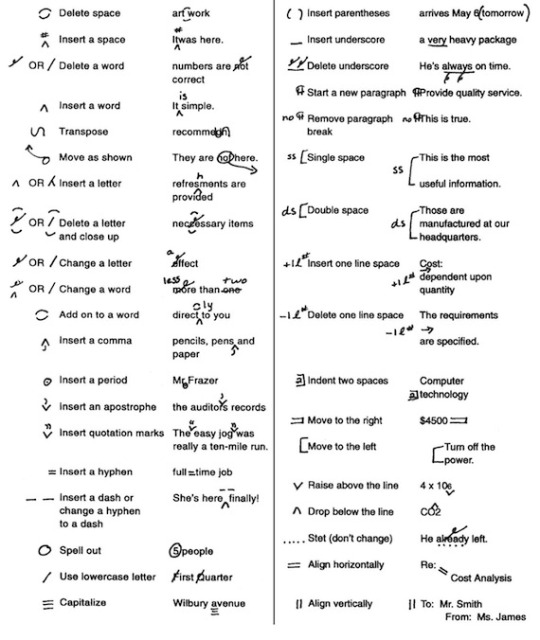
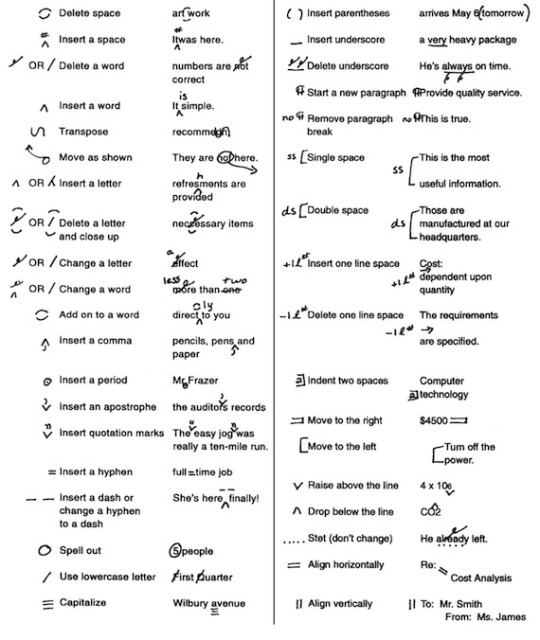
A conversation with my copyeditor
By Edan Lepucki
An in-depth look at a copyeditor’s process
I’ve fallen in love with my copyeditor, Susan Bradanini Betz. Not only did she find all the mantle/mantel homonym errors in my novel manuscript, but she also helped me with my commas and discovered a couple of embarrassing inconsistencies. (“First she had a briefcase,” one of her notes reads. “Now it’s a suitcase.”) She is both respectful of style and sharp as knives about grammar. Also, she said she’d read a sequel to my book—if not a whole series!—so of course I love her.
I’ve always been curious about a copyeditor’s process, and Susan was kind enough to answer a few questions of mine. Susan has been in the publishing business for, as she puts it, a zillion years. She’s worked in-house as both a copyeditor and an acquisitions editor and currently freelances, mostly for Knopf and Soho Press. She recently started working with Little, Brown again, which was one of her main clients in the 1980s and 1990s. She lives in Chicago.
The Millions: You have worked in book publishing for years, not only as a copyeditor but also as an in-house editor doing acquisitions and all that. You told me copyediting is your favorite of these jobs. Why?
Susan Bradanini Betz: When I copyedit, I get closer to the manuscript than I was ever able to as an acquisitions editor. I read every single word, looking at each word and tracking the syntax, not skimming over sentences. It’s not my job as a copyeditor to suggest big-picture changes or comment on quality, so I am focused on the story and the language at the word and sentence levels. I keep the reader in mind and try to anticipate what might be confusing or problematic; I check facts and dates and track characters and events for consistency; and I do the most thorough read I possibly can, coming away with an in-depth understanding of the work that wasn’t possible for me in acquisitions.
As a freelance copyeditor, I work for publishers who expect me to do a thorough job. And when I find an error in a novel’s chronology or an incorrect date in a nonfiction book, I feel that is as important to the integrity of the book as when I used to suggest switching chapters around.
TM: What are the copyeditor’s particular pleasures and challenges?
SBB: I love being able to read a manuscript closely, word by word, or even—when something is particularly dense—syllable by syllable. (Yes, I have done that.) The main challenge, other than the usual one of balancing deadlines with quality, is making a sustainable living as a freelance copyeditor.
TM: Can you describe how you go about copyediting a manuscript? What’s your reading process like? How in the hell do you manage to catch the smallest of errors?
SBB: Ideally, I’d have time to read through every manuscript twice: once to mark everything and once just to read and find whatever I missed the first time through. But the schedules don’t allow for that. Plus, I usually end up reading each sentence multiple times anyway.
So when I get a manuscript, I just start right in on page 1. I don’t page through or skim the manuscript first, because I want to be aware of the evolution of the story and the order in which information is presented. That way, if some detail important to the reader’s understanding was inadvertently dropped in the author’s revision process, I’m more likely to catch it.
I usually read the first sixty to a hundred pages without marking anything but the most cut-and-dried items—serial commas, typos, backward quotation marks, those sorts of things. I start my style sheets right away on page 1, keeping track of the author’s existing style for thoughts, words, dialogue, and so on and noting what seems intentional and what seems unintentional.
Once I’m familiar with the author’s style and voice, which usually happens around page sixty, I begin making copyediting changes that I hope are consistent with the author’s intent and the publisher’s expectations. I query a lot rather than changing a lot. When I reach the end of the manuscript, I go back and copyedit those first sixty pages.
Creating style sheets is the secret to catching small errors. I am obsessed with my style sheets. I keep a word list, a character list, a list of places (fictional and real), a chronology, a general style sheet, a list of hyphenated modifiers, and any other list that helps me keep track of everything. I usually fact-check as I go, although when I’m pressed for time, I make a list of items to look up later, sometimes after I’ve returned the manuscript to the publisher. In those cases, I send a list of corrections that can be added by the production editor to the first pass. (Ha-ha, if someone else wrote this paragraph, I’d query the repeat of “list”—I used it seven times in five sentences.)
Because I read slowly, I also remember odd little details that provide a strong visual image, and so as I read along, if my visual image is jarred by a description, I’ll backtrack to figure out whether there’s some inconsistency. I remember more details about characters in novels I’ve copyedited than I remember from my own life.
TM: Can you turn off your copyediting mind when you’re reading for pleasure?
SBB: No, I can’t turn it off, but believe it or not, that mind-set makes pleasure reading more pleasurable for me. When reading for pleasure, I don’t read as slowly as when I copyedit, but I am not a fast reader. Often I will read a sentence more than once, then flip back and forth, comparing it with other sentences, just as I do when copyediting. I think I’ve always read like a copyeditor, even way back before I knew what a copyeditor was. One of my favorite authors is Proust, and when I was young, I would read some of his sentences over and over, trying to make sure I understood how every word related to the other words and just to make sure I understood what he was saying.
TM: So I guess it’s possible to have fun reading while you’re copyediting…
SBB: Yes! I have fun reading nearly all the manuscripts that come to me—maybe all. I think of my job as publishers setting up an amazing reading list for me.
I try not to read ahead of my editing, but sometimes it’s impossible not to because I’m so caught up in the story. Many things can be noticed only when you are reading slowly and reading something for the first time. If I read ahead, I have to go back and reread everything at a copyediting pace. But because I already know what’s going to happen, I might make assumptions that don’t take into account the reader’s limited information at that point in the story.
TM: In a conversation between Michael Pietsch and Donna Tartt that ran in Slate, Pietsch quoted from the letter Tartt sent to her copyeditor for The Goldfinch:
I am terribly troubled by the ever-growing tendency to standardized and prescriptive usage, and I think that the Twentieth century, American-invented conventions of House Rules and House Style, to say nothing of automatic computer functions like Spellcheck and AutoCorrect, have exacted an abrasive, narrowing, and destructive effect on the way writers use language and ultimately on the language itself. Journalism and newspaper writing are one thing; House Style indubitably very valuable there; but as a literary novelist who writes by hand, in a notebook, I want to be able to use language for texture and I’ve intentionally employed a looser, pre-twentieth century model rather than running my work through any one House Style mill.
What are your thoughts on Tartt’s argument? (And were you the copyeditor to receive this note?!)
SBB: Yikes—no, fortunately, I wasn’t the copyeditor to receive that note. But often, when an author has that kind of reaction, it’s a result of misunderstanding. Most copyeditors don’t want to alter anything in a manuscript that the author has done on purpose.
The house style is set by the publisher, and copyeditors generally receive a manuscript without any guidelines other than to follow the house style for that publisher. And “house style” doesn’t refer to writing style but refers to mechanics such as capitalization, hyphenation, spelling (most often the house dictionary is Webster’s Eleventh), and so on. In addition, copyeditors watch for dangling modifiers, subject-verb and antecedent-pronoun agreement, repeating words, chronology, and consistent names and dates, among other things. And they are expected minimally to verify dates, proper nouns (personal names, place-names, streets and highways, institutions, etc.), foreign words, brand names, and slogans or advertisements—really, to verify as much as possible within the allotted time. Add to that that freelancers have no benefits and work for an hourly rate, so getting continual work from a publisher is important. What all that means is that the copyeditor is pressed for time and is unlikely to go against house style unless instructed to do so, for fear that the publisher will think she just doesn’t know how to copyedit.
Copyeditors are always guessing at the author’s intentionality, and a copyeditor who assumes everything the author has done is inadvertent does come off as a harsh schoolmarm. For example, in the note, the author writes, “Twentieth century, American-invented conventions.” A copyeditor would revise that as “twentieth-century, American-invented conventions,” assuming that the cap T in “Twentieth” was a typo and the inconsistent hyphenation of compound modifiers was an oversight. However, “House Style,” which is not a proper noun, is capped three times in one paragraph. For me, that would be a signal that the author might have a personal cap style that I shouldn’t mess with. So I’d probably query the author about her intentionality regarding caps, calling out the occurrences so she can double-check that everything is as she wants it. If the copyeditor doesn’t at least call out the nonstandard style with a query, someone will do it later—either the production editor or the proofreader or even someone in publicity. And if the issue is raised after typesetting, the publisher is perfectly justified in asking why the copyeditor hadn’t settled that question earlier.
But that said, as an acquisitions editor, I saw copyeditors make all sorts of unjustified changes. And when I was acquiring poetry and fiction, I would sometimes lose it myself when I saw what copyeditors would do. I once had a copyeditor rewrite the last paragraph in a novel, which made the author (and me) go ballistic. The final paragraph! As if the author hadn’t given it considerable thought.
And sometimes a copyeditor is just mismatched to a project. Last year a publisher asked me to do a second copyedit on a memoir that had been thoroughly (way too thoroughly) copyedited already. The first copyeditor had changed so much that the author became paralyzed about a third of the way through his review of the copyeditor’s changes. According to what the publisher told me, and from what I could tell from the author’s comments on the copyeditor’s comments, he not only felt the copyeditor didn’t understand his work, but he started doubting his own choices. When I looked at the first copyedit, I understood the reasons behind nearly all her changes, but I also saw that she clearly did not get this author’s humor or his unique voice, which often involved nonstandard syntax. She had done a ton of work recasting passive sentences and paring down “awkward” (and by “awkward” I mean “hilarious”) sentences. And in many places he had agreed to a change that, honestly, purged all the humor and personality from a passage. So then I would query whether it was OK to reinstate his original, as it was better than the copyedited version. That was a case of a complete mismatch.
TM: Is there a tension between what you know to be “correct” and the artistic license of the writer? How do you handle that tension?
SBB: I see my job as a copyeditor as less about enforcing rules than about making sure the author is aware of anything in the manuscript that is nonstandard and confirming that any variations from standard grammar and punctuation are intentional. In my queries, I try to get across the idea that just because I’m asking a question doesn’t mean that something needs to be changed. As you know, I often qualify my questions by saying something like “just checking” or “it might be just me” or “not really necessary to change.” Especially with poetry, I love when an author responds with “yes, that is intentional,” because it means he or she truly thought through the style, so I don’t have to be so OCD about it.
TM: Have you noticed any new style and grammar trends in the last five years?
SBB: New copyediting trends generally pop up after a new edition of The Chicago Manual of Style is published, and the sixteenth edition came out in 2010. New guidelines in CMoS cause publishers to reevaluate their current house styles, because they have to decide what changes they will incorporate from the new edition. These are changes like what to do about capping a generic geographic noun when it follows more than one proper noun—so is it “Illinois and Chicago rivers” or “Illinois and Chicago Rivers”? The style has changed back and forth over the last editions of CMoS, but it’s something really only copyeditors get excited about.
For informative and entertaining updates on the state of copyediting, I keep up with Washington Post copyeditor Bill Walsh’s Twitter feed.
Just anecdotally, in the manuscripts I receive, I’ve noticed a lot of two-word proper nouns closed up (like SpongeBob), a result of tech product names, I guess. So when an author creates a fictional product or company now, it’s often one word made up of two.
I’ve noticed, too, that a lot of authors are omitting the word “that” and putting a comma in its place in dialogue or first-person narratives in fiction. I think that’s because many throwaway phrases currently used in conversation omit “that,” and the speaker pauses—for example, “I mean, I had a really good time at the party.” Almost every novel I’ve worked on in the past few years had at least one “I mean…” in dialogue. And in just about every conversation I have in real life, someone uses the phrase. But the comma for an omitted “that” happens with other constructions too, as in “She was so late, she missed the show” rather than “She was so late she missed the show” or “She was so late that she missed the show.”
TM: What are your favorite errors to fix?
SBB: I love to find errors that are important to the accuracy or quality of the manuscript, because then I feel as if my copyediting is contributing something more than tiny details—for example, a character being described as not having visitation with his kids but later taking them somewhere on “his” weekend, or someone beginning a scene sitting on a couch and then rising from a chair, or a character drinking a shot of whiskey but getting a refill on her red wine. Those are errors that usually result from the author’s revisions and multiple drafts, and they can slip past easily. I also like to catch dangling modifiers, because we all miss those, so it means I’m paying attention. I never change any of these, though, without querying, and most often I will just call them out to the author with a query. And yes, I have had authors who say that dangling modifiers are part of their style and don’t want to change them.
TM: I am proud that you said my manuscript was “clean,” but I was also appalled by my misuse of the comma! Can you provide three rules for comma use to put in my back pocket for the next book?
SBB: It isn’t so much that commas are misused as that authors often don’t realize their phrasing is effective enough to make the addition of nonstandard commas unnecessary. A comma isn’t always needed to make the reader catch a pause in dialogue or narrative; often the syntax does that just fine, and an unnecessary comma slows the reader down too much.
So in addition to the serial comma (“I adopted a lab mix, a poodle, and a Lhasa mix”), here are the three commas that I think work best when handled per standard punctuation style:
1. Avoid a comma between elements of a series connected by conjunctions.
I adopted a lab mix and a poodle and a Lhasa mix.
2. Add a comma between independent clauses connected by a conjunction unless each clause is short, especially if the conjunction is “but.”
I used to foster dogs, but I had to stop after I adopted Frank.
3. Avoid using a comma between compound predicates or objects.
I brought Frank home as a foster dog and just couldn’t return him to the shelter.
I’ve had many dogs but never bought a puppy from a pet store.
I feed my dogs kibble and homemade treats.
4. And a bonus tip: Always add a comma after a phrase or clause ending in a preposition to avoid “reading on.”
After I put my coat on, the dogs knew it was time to go out. (Even “After I put on my coat, the dogs knew it was time to go out” reads better with the comma, though there’s no chance of reading on.)
A version of this article originally appeared on The Millions.
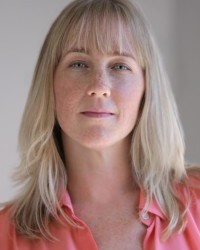
Edan Lepucki
Edan Lepucki is a staff writer and contributing editor for The Millions. She is the author of the novella If You’re Not Yet like Me, the New York Times best-selling novel California, and Woman No. 17, which was published in spring 2017.
0 notes